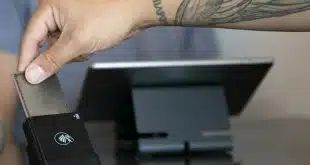The United States has admitted close to 20 million migrants just since 2020. Most are penniless, and receive payment cards to enjoy a dinner and a pillow. But abuse is rampant, crime is spreading, and the government is losing control.
Migrants are a global problem affecting all developed countries. Human compassion runs against law and order, and matters only get worse. Millions have escaped war zones, floods, and other natural disasters. Oppressive regimes and climate change are adding to the mix, and there is no solution in sight.
Surprisingly, modern payment technology can pitch in. Introducing the migraphone, a phone turned into both a wallet and a bank. Loaded with identity-bearing digital money, this device can be handed to the waves of incoming migrants. Each migraphone is activated through facial recognition or other biological markers, and each can be freshly loaded, weekly or even daily, with money allotted for use during the same week. It becomes useless afterwards.
Only designated merchants can receive these migraphone digital dollars and redeem them for regular dollars. This ensures that recipients will use the public’s generosity for base survival, not for excessive purposes. The payment process is simple: you hold the phone close to the merchant’s payment device and click “pay.”
The migraphone can be used to control the distribution of migrants throughout the country, avoiding an overload on more generous communities. Each migrant will have his or her weekly allotment good for payment only in the city or county where the government wishes them to reside. When a migrant falls under suspicion of wrongdoing, his or her weekly funds will stop, replaced by a phone message to present themselves at the nearest police station to be checked out regarding that suspicion.
The government could evenly and equitably distribute the migrant population by simply shifting the eligible redeemers of the digital dollars from, say, Portland to Miami.
These would be survival dollars. Some migrants will be entrepreneurial, make something, and sell it. Migrants are largely unbanked, but the migraphone comes to the rescue once more. We have today the effective and convenient cryptography that would turn a migrant’s phone into the migrant’s bank.
Now we are talking about money of a different flavor. Unlike survival dollars, business dollars will last forever. Migrants working in the cash economy will go to exchange stations to pay with banknotes and receive digital dollars into their phone. We know how to keep the money in the wallet safe and secure. The business dollars can be used in any way regular dollars are used.
This is the power of “financial flavor.” Survival dollars are of one flavor, and business dollars are of a different flavor. There may be more flavors as needed, allowing for society to manage its money in a most beneficial way. I have described this “flavor” issue in my critically acclaimed book, “Tethered Money.” It was the one feature that attracted the People’s Bank of China to buy BitMint digital-money technology (it passed a tough stress test).
The migraphone itself will be bare-minimum technology to keep costs down. Anything besides payment features will be added only if it is cheap enough. In its current design, the migraphone may be worn like a digital watch, but that remains to be worked out.
The technology for the migraphone is well-developed. BitMint digital money, as well as other digital coins, comply with the requirements. The politics of mass immigration notwithstanding, as long as millions of undocumented migrants are among us, we must use some form of documentation and behave compassionately. That is what the migraphone does.
—Gideon Samid gideon@bitmint.com




